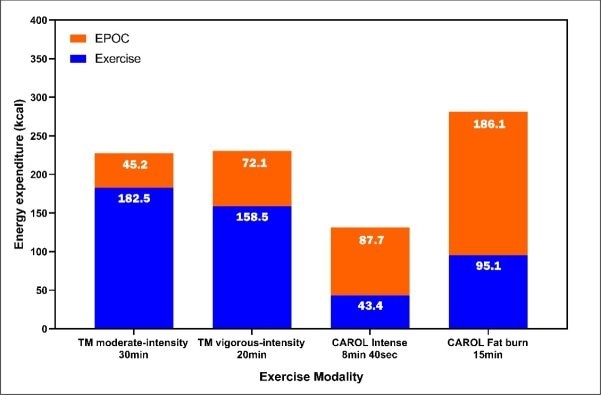Scientific evidence: REHIT session on a CAROL bike contributes to greater post-exercise metabolism
The results recently published by the American Council on Exercise (Quantifying EPOC After REHIT, by Lance C. Daleck, PhD, Aidan M. Dalleck and Bryant R. Byrd, MSc with Daniel J. Green, August 2021) are significant because a meaningful increase in EPOC (excessive post-exercise oxygen consumption) over the long term can have an important impact on calorie expenditure and help people achieve weight loss and weight maintenance and improve their fitness.
Initially published in the peer-reviewed International Journal of Research, the study compared the metabolic responses and EPOC to moderate and vigorous treadmill workouts to shorter, REHIT (reduced exertion high intensity training) rides on a CAROL bike.
The researchers at the High Altitude Exercise Physiology Program at Western Colorado University, led by Lance Dalleck, PhD, found that overall energy expenditure of a REHIT session on a CAROL bike, i.e. calories burned during exercise and calories burned via EPOC after training on the CAROL fat burn ride, was more than 2.5 times greater than vigorous intensity treadmill exercise. EPOC following the CAROL 8 minute and the 40-second intense ride was two times greater than moderate intensity treadmill exercise.
Exercise guidelines often talk about the benefits of exercise being tied to energy expenditure, but it’s important to understand that energy is expended both during and after a bout of exercise. This study reveals that one of the mechanisms that shorter REHIT workouts can do is elicit comparable benefits to traditional moderate-intensity exercise of a longer duration.”
Lance Dalleck, PhD, Western Colorado University
The CAROL bike (Cardiovascular Optimization Logic) is an AI-powered exercise bike that combines science, engineering, and AI with personalized short, intelligent, scientific workouts that deliver measurable results using REHIT. REHIT workouts on CAROL are scientifically proven to give you double the health and fitness benefits in 20% of the time compared to traditional exercise. AI-powered sessions on CAROL give you the cardiorespiratory benefits of a 45-minute run in 8 minutes 40 seconds.
This latest study of over 30 healthy people between the ages of 25 and 76 provides a gold-standard measure of the exercise energy expended during the CAROL bike’s fat burn and intense rides. And, secondly, it provides scientific evidence to support the notion that personalized, true REHIT performed on the CAROL bike contributes to a significantly greater increased post-exercise metabolism. This means that more calories are burned after exercising, leading to further training adaptations over time than traditional workouts.
The overall energy expenditure (i.e., caloric expenditure during exercise and calories burned via EPOC) of two CAROL rides and two bouts of treadmill exercise can be seen in the table below.

ACE sponsored two earlier studies exploring REHIT on the CAROL bike. The first study (May 2019) quantified acute and chronic responses and found that REHIT workouts elicited more potent and time-efficient improvements in cardiorespiratory fitness and cardiometabolic health than traditional moderate-intensity continuous training. The second study (December 2019) found that REHIT can combat the harmful side effects of a sedentary lifestyle and can be an important, time-efficient strategy to motivate people to exercise.
“HIIT and REHIT are often talked about in terms of performance and fitness, but this research shows that ramping up EPOC can help people achieve weight loss with just a short bout of exercise. This can have an important impact on the overweight and obesity epidemic”, says Dr Dalleck.
CAROL
Dalleck, L.C., et al. (2021) The Metabolic Responses and EPOC of CAROL: an AI-Powered Exercise Bike. International Journal of Research in Exercise Physiology. https://ijrep.org/wp-content/uploads/lana-downloads/2021/05/dalleck.et_.al_.spring.2021-2.pdf.
Posted in: Medical Research News | Healthcare News
Tags: Burn, Cardiometabolic, Chronic, Exercise, Metabolism, Obesity, Oxygen, Physiology, Research, Weight Loss
Source: Read Full Article



